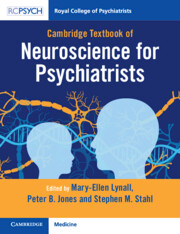Book contents
- Cambridge Textbook Of Neuroscience for Psychiatrists
- Reviews
- Cambridge Textbook of Neuroscience for Psychiatrists
- Copyright page
- Contents
- Contributors
- Introduction
- 1 Cells
- 2 Neurotransmitters and Receptors
- 3 Basic Techniques in Neuroscience
- 4 Neuroanatomy
- 5 Neural Circuits
- 6 Modulators
- 7 Genetics
- 8 Neurodevelopment and Neuroplasticity
- 9 Integrated Neurobiology of Specific Syndromes and Treatments
- 9.1 Autism
- 9.2 Attention Deficit Hyperactivity Disorder
- 9.3 Drug Use, Addiction, Tolerance, Withdrawal and Relapse
- 9.4 Anxiety Disorders
- 9.5 Post-Traumatic Stress Disorder
- 9.6 Obsessive–Compulsive and Related Disorders
- 9.7 Major Depressive Disorder
- 9.8 Bipolar Affective Disorder
- 9.9 Psychosis
- 9.10 Schizophrenia
- 9.11 Borderline Personality Disorder
- 9.12 Self-Harm and Suicidality
- 9.13 Medically Unexplained Symptoms
- 9.14 Delirium
- 9.15 Perinatal Disorders
- 9.16 Sleep Disorders
- 9.17 Eating Disorders
- 9.18 Epilepsy and Seizures
- 9.19 Electroconvulsive Therapy
- 9.20 Brain Stimulation
- 10 Neurodegeneration
- Index
- References
9.3 - Drug Use, Addiction, Tolerance, Withdrawal and Relapse
from 9 - Integrated Neurobiology of Specific Syndromes and Treatments
Published online by Cambridge University Press: 08 November 2023
- Cambridge Textbook Of Neuroscience for Psychiatrists
- Reviews
- Cambridge Textbook of Neuroscience for Psychiatrists
- Copyright page
- Contents
- Contributors
- Introduction
- 1 Cells
- 2 Neurotransmitters and Receptors
- 3 Basic Techniques in Neuroscience
- 4 Neuroanatomy
- 5 Neural Circuits
- 6 Modulators
- 7 Genetics
- 8 Neurodevelopment and Neuroplasticity
- 9 Integrated Neurobiology of Specific Syndromes and Treatments
- 9.1 Autism
- 9.2 Attention Deficit Hyperactivity Disorder
- 9.3 Drug Use, Addiction, Tolerance, Withdrawal and Relapse
- 9.4 Anxiety Disorders
- 9.5 Post-Traumatic Stress Disorder
- 9.6 Obsessive–Compulsive and Related Disorders
- 9.7 Major Depressive Disorder
- 9.8 Bipolar Affective Disorder
- 9.9 Psychosis
- 9.10 Schizophrenia
- 9.11 Borderline Personality Disorder
- 9.12 Self-Harm and Suicidality
- 9.13 Medically Unexplained Symptoms
- 9.14 Delirium
- 9.15 Perinatal Disorders
- 9.16 Sleep Disorders
- 9.17 Eating Disorders
- 9.18 Epilepsy and Seizures
- 9.19 Electroconvulsive Therapy
- 9.20 Brain Stimulation
- 10 Neurodegeneration
- Index
- References
Summary
Occasional or ‘recreational’ use of drugs of abuse may result in pleasurable effects such as euphoria and reduced anxiety. Regular use leads to dependence and addiction through a series of steps. Initial drug-seeking behaviour and positive reinforcement increase use and cause neural adaptations. Adaptations in key parts of the brain manifest as tolerance, where more drug is required to achieve the same effects, and to withdrawal in the absence of the drug. With repetitive use comes attribution of salience to the drug. Associated environmental items become conditioned stimuli that drive further, repetitive drug-seeking behaviour.
- Type
- Chapter
- Information
- Cambridge Textbook of Neuroscience for Psychiatrists , pp. 403 - 409Publisher: Cambridge University PressPrint publication year: 2023



